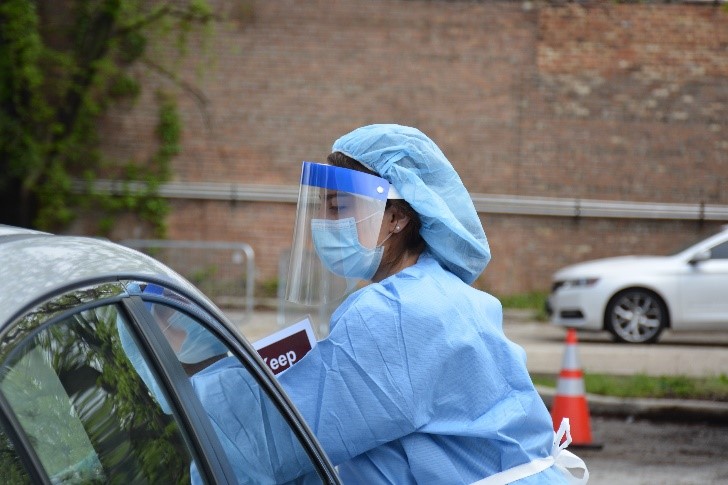Since 2001, the Greater Auburn Gresham Development Corporation (GAGDC) has been fostering community revitalization through comprehensive community development strategies in seven southside neighborhoods in Chicago. Within the first month of the coronavirus (COVID-19) pandemic outbreak, statistics revealed that southside, predominantly Black communities, had some of the highest numbers of infection and death across the city.
From its inception, community engagement at GAGDC begins with organizing residents and other community stakeholders to develop a quality-of-life plan that integrates existing and planned activities that align with stakeholder identified strategies. This step is followed by assessing existing programs, identifying service deficiencies, and generating organizational and community commitments to address them. Lastly, GAGDC partners with other organizations to attract and integrate new or improved services as well as creating quality recreational and social opportunities for the community.

GAGDC has always had “Health” as one of their pillars of programming that supports broader southside communities. Their response to COVID-19 was to focus all the attention of staff to build a comprehensive relief program. GAGDC became an exemplary community organization that pivoted quickly and effectively to support residents. In addition to Health, the other main areas of community support at GAGDC are: Education, Seniors, Housing, Economic Development, and Community Engagement. These areas also devised new and creative programming in response to COVID-19, infusing new approaches into well-established pillars of support.
Health services: Recognizing the imminent danger of the coronavirus, in March GAGDC moved quickly to establish a testing site. Situated across from the office, walk up/drive through service became available for the community, in a central location, easily accessible by CTA. In addition, GAGDC set up a mobile testing process, enabling many homebound seniors to be tested who otherwise would not have been able to make their way to a testing site. Outdoor health fairs, a regular component of programming at GAGDC, were continued and enhanced. COVID testing was coupled with PPE distribution to 125,000 people and community organizations. In addition, blood pressure checks and other resources were offered to the community, in partnership with UIC Health, Advocate Health Care, and various other health organizations. All services were free, including testing. Turnout of 1,000 people at the fairs indicates the essential role of GAGDC in offering community support.
Education: In the midst of planning for summer, which usually involves a robust in-person program serving 50 youth, the popular AG Gold summer camp switched to a hybrid program with youth coming to GAGDC only once a week. During the other three days per week, CPS teachers with the assistance of ISU STEP-UP fellows held virtual sessions for kids. Once staff identified families needing technology equipment, as well as those with connectivity issues, GAGDC jumped in to purchase Chromebooks for all those in need and paid for “hot spots” for families without reliable Wi-Fi. As a result, 20 youth participated in summer programming. After-school programming has always been an integral part of GAGDC’s Education programming. Because school remained virtual for CPS students in the fall, new online options were devised such as yoga and stress relief that responded to the needs of parents as well as children. New partnerships were also created, to offer art, literacy, and STEM programs, with “Music to Merit,” “Next Wave Stem,” and other education organizations.
Senior/Housing services: To address the issue of food instability undermining community health across the city, GAGDC hosted “Food Stability Pop-Up” events throughout the summer and continuing throughout the pandemic. To date, GAGDC has held over 40 pop-ups, and plans to continue as long as there is a community need. A strong partnership with the Greater Chicago Food Depository was established resulting in 125,000 community members receiving an abundance of healthy food at the “pop-up” events, conveniently situated in the former Save-A-Lot parking lot off Halsted and 80thstreet. Delivered meals became another component of the programming. Groups of chefs prepared and dropped off meals at GAGDC. In turn, staff personally delivered 7,000 delicious meals to families. More donations arrived in June when GAGDC secured a giant load of baby products (11 pallets)! Wanting to distribute the resources as quickly as possible, Staff (and their kids) made bags for moms in Auburn Gresham and adjacent communities. Lastly, families impacted by COVID-19 and in financial distress were encouraged to come to the GAGDC office for rental assistance. By the end of 2020, $850,000 of resources were distributed to families and individuals.

Regular check-in phone calls to community members made by staff enables GAGDC to have clarity about persistent risks, dangers and concerns of their residents. As the pandemic continues to sweep through Chicago, particularly ravaging low-income communities of color, worries about safety of the vaccine are expressed. Staff are currently working on how best to promote effective public education about vaccines within their community. Making flyers, talking to people, and mapping out the neighborhood are ongoing tasks for the near future, as well as continued financial and rental assistance.Check-in phone calls also reveal the deep appreciation for the services offered by GAGDC and continue to be a reminder of the impact that community partnerships have on the overall health of neighborhoods.
Illinois State University’s National Center for Urban Education is proud to partner with community-based organizations that stand ready to pivot to support their neighborhoods as new challenges arise.

